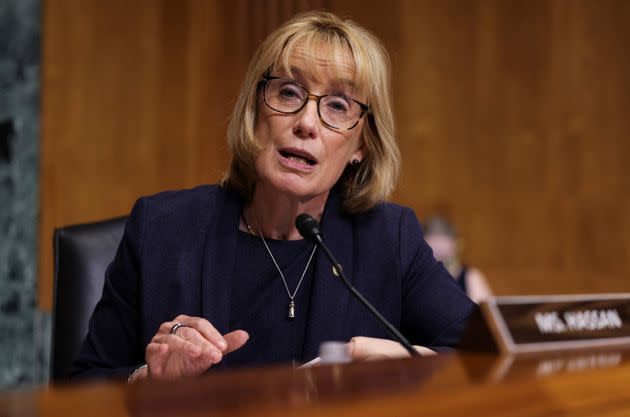White House Walks Political Tightrope With Plan To Criminalize Fentanyl
- Oops!Something went wrong.Please try again later.
- Oops!Something went wrong.Please try again later.
- Oops!Something went wrong.Please try again later.
- Oops!Something went wrong.Please try again later.
White House attempts to reach a middle ground on how to confront the still-raging opioid epidemic have drawn fire from across the ideological spectrum, with progressives charging President Joe Biden with continuing a failed drug war and some conservatives arguing he is soft on drug traffickers. But the plan may still find a congressional sweet spot.
At issue is the White House Office of National Drug Control Policy’s recommendation to permanently criminalize fentanyl, a synthetic opioid that played a major role in driving a 30% increase in drug overdose deaths in 2020, according to the Centers for Disease Control and Prevention. The overdose death toll increase ― to over 93,000 ― is one of the largest in American history.
Starting in 2018, an emergency order classified fentanyl and its analogs ― a wide variety of drugs with similar chemical structures ― under Schedule I, a category for substances like heroin and LSD with no accepted medical use. That order, set to expire in May, was extended by Congress until October.
But that extension infuriated some progressives, who pointed out that fentanyl had long been prescribed by doctors as a painkiller. They argued the administration was continuing the policies of a failed drug war.
At the time, the White House said it would work to address progressive concerns.
The Office of National Drug Control’s proposal, released earlier this month, aimed for a compromise: It would permanently classify fentanyl as a Schedule I drug ― a major request of both moderate Democrats and Republicans ― but would exempt nonviolent offenders from mandatory minimum sentencing requirements that typically go along with the designation. It would also change the rules to allow for more research of Schedule I drugs, which the administration said should help better understand and prevent overdoses and addiction.
The proposal immediately came under fire from both polarized ends of the ideological spectrum. Arkansas GOP Sen. Tom Cotton said the mandatory minimum sentencing exceptions were “unacceptable.” A coalition of progressive and civil rights groups said it “echoes the failed drug policies of our past.”
“It seems to be the same, old knee-jerk response to the problems around drugs in this country,” said Jesselyn McCurdy, a top official at the Leadership Conference on Civil and Human Rights. “After 50 years of the War of Drugs, we see that just criminalizing drug users is not working.”
Those with the final say are likely to be a cadre of moderate senators hailing from states decimated by the opioid epidemic, including Sens. Joe Manchin (D-W.Va.), Maggie Hassan (D-N.H.) and Rob Portman (R-Ohio.) And they seem open to the White House proposal.
In an interview earlier this year, Hassan took aim at progressives who she thought were naive about the need to punish distributors of fentanyl and fentanyl analogs, which are increasingly mixed with more common recreational drugs.
“We do need a public health approach,” Hassan said. “But we also need to be clear-eyed about who’s driving this epidemic, whether it’s vicious cartels or overzealous big pharmaceutical companies who are prescribing drugs they know are addictive.”

Hassan, who is facing a potentially difficult reelection against GOP Gov. Chris Sununu, has made fighting the opioid epidemic a key part of her political identity in the Biden era. She helped spike the potential nomination of Janet Woodcock to run the Food and Drug Administration over fears Woodcock was too close to the pharmaceutical manufacturers that helped fuel the initial stages of the opioid epidemic. (Hassan has her own ties to the pharmaceutical industry, having taken tens of thousands in corporate PAC donations from pharma companies over the years.)
Hassan, however, seems inclined to support Biden’s proposal. A spokesperson said the senator was still reviewing feedback on the plan, but was “pleased to see the administration recognize and take continued action to keep fentanyl and similar substances under tight control.”
Portman, who co-sponsored legislation with Manchin to permanently place fentanyl on Schedule I, similarly praised the compromise proposal.
“Not only is a permanent solution critical in our battle against addiction in this country, but it is also vital in ensuring law enforcement can continue to protect our communities by bringing criminal actions against individuals who manufacture, distribute, or handle these deadly drugs,” Portman said.
The White House began briefing lawmakers and discussing the proposal last week, and is hopeful the plan can pass Congress before the extension expires on Oct. 22 amid a crowded schedule in both chambers.
Still, McCurdy and other progressives hope to persuade Democrats to reject the administration’s proposals. She said civil rights groups are seeking to work with allies like Sen. Cory Booker (D-N.J.) and members of the Congressional Black Caucus in the House to reject the proposal.
The Biden administration touts its public health steps to deal with the crisis. The administration has requested more than $10 billion for the Department of Health and Human Services to expand substance abuse treatment programs, and backed legislation designed to eliminate sentencing disparities between white and Black drug users.
Many of these moves have come under fire from conservatives. Republicans, including Cotton, pounced on a Fox News report saying Biden’s fentanyl proposal amounted to weakening penalties for drug trafficking ― ignoring that the penalties were set to go away entirely if an extension isn’t passed into law.
So far, the mandatory minimum penalties the administration is seeking to eliminate have applied in just eight cases prosecuted since the original emergency scheduling went into place in 2018.
This article originally appeared on HuffPost and has been updated.




